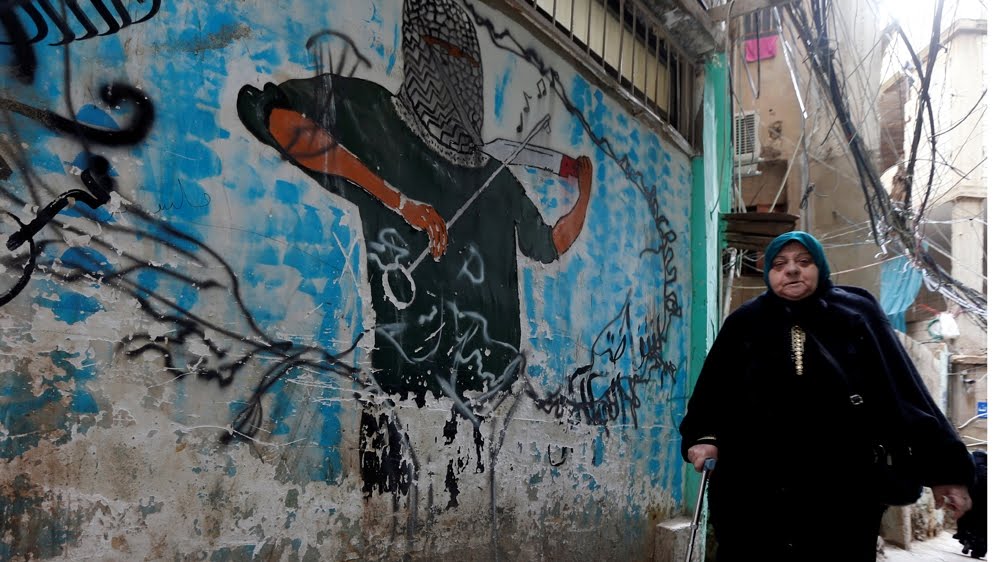One family, three women, 70 years in exile
Farah
Najjar, Al Jazeera, may 28, 2018
The
collective story of being a female Palestinian refugee in Lebanon as seen
through the lives of a family of women.
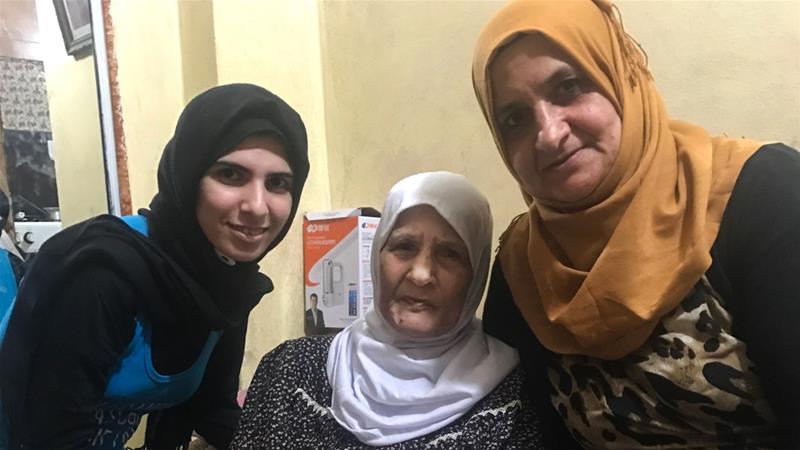 |
|
Ramz,
left, Zahiya, centre, and Leila, right, have created their own traditions with
the rest of the family, including a weekly gathering in the family home [Al
Jazeera]
|
Beirut,
Lebanon - On a June morning in 1982, Leila Balqees joined her amputee father to
watch the news on TV, as he did every day.
For Leila,
who was 17 and engaged at the time, that day had started out just like any
other in Burj Barajneh, a cramped Palestinian refugee camp on the southern edge
of Lebanon's capital, Beirut.
It soon turned into a nightmare.
"The
strikes started coming, left right and centre on the entire camp," recalls
Leila, now 56.
On that
day, Israel launched a fierce aerial and ground assault,
claiming it was to push Palestinian Liberation Organization (PLO)
fighters away from its northern borders.
The
three-month offensive, which came at a time when Lebanon was already embroiled
in a civil war that would eventually last 15 years, killed thousands of
Palestinian refugees and severely damaged the poorly constructed houses in
Beirut's camps - including Leila's family home.
"I
saw the walls fly off from down the road," she says earlier this month,
sitting in the same living room that was torn apart in one of the first days of
the Israeli operation.
Like many
Burj Barajneh residents, Leila, her mother and three sisters sought shelter in
a nearby area. But her father refused to leave their home for the first month
of the bombardment.
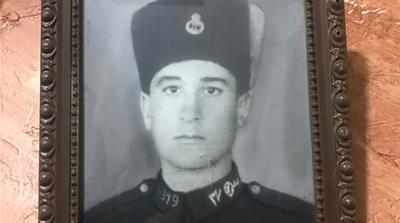 |
|
A photo
of Leila's late father hangs
in the living room [Al Jazeera]
|
|
"He
used to say, 'if I can't die in Palestine, I'll just die here'," Leila
says.
Eventually,
their neighbours, fearing for his safety, physically moved him to join his
family.
|
"He
used to say, 'if I can't die in Palestine, I'll just die here'," Leila
says.
Eventually,
their neighbours, fearing for his safety, physically moved him to join his
family.
After the
assault ended, they returned to "half a home" - the living room, one
bedroom and part of the kitchen were destroyed. It took them years to rebuild.
Standing
to this day, the two-bedroom flat in one of Burj Barajneh's unregulated, high
brick structures is the same building that Leila was born in back in 1962 - and
the only home she has ever known in Lebanon.
One of
millions of Palestinians forced to live away from her ancestral home, Leila has
been a refugee her whole life.
Her story
is not unique, but her strength and resilience paint a striking picture of the
collective story of Palestinian women in Lebanon - as evidenced by the hurdles
she overcame, from surviving an Israeli offensive to defying hardship to raise
four daughters as a single mother.
|
||
'We have
nothing else'
Described
as a city within a city, Burj Barajneh sprawls along the side of a busy highway
linking southern Beirut to the capital's city centre.
Set up in
1948 to host Palestinians fleeing their villages and towns after being attacked
by Zionist militias, the camp is today home to about 50,000 people. It is one
of the 12 camps - run by the UN agency for Palestinian refugees (UNRWA) -
housing most of the nearly half a million Palestinians in Lebanon.
At Burj
Barajneh's main entrance, tattered Palestinian flags hang alongside faded
emblems of Palestinian political parties.
Once
inside, a narrow pathway leads into the camp, lined with stalls of vendors
selling coffee and freshly squeezed juice while men of all ages, some puffing
away at shishas, sit idly on plastic chairs.
A few
metres further in, the alley widens - and the markers of a factionalised
community become clearer.
Armed men
acting as the camp's security apparatus stand at their designated wooden
booths. Some are dressed in casual clothing; others in green army jumpsuits -
but they all answer to the major parties in
control of the camp, including Fatah, Hamas and the Popular Front for the
Liberation of Palestine.
Winding
deeper into the maze of narrow lanes, rows of bullet-ridden, graffiti-covered
buildings appear. The worn-out buildings are packed so tightly together that
it's hard to tell at any given time what time of the day it is.
As the
paths get tighter and narrower, a thick canopy of electricity wires intertwined
with water pipes hangs low over the alleyways. There are flags everywhere,
interspersed with posters of camp residents who lost their lives either during
the Israeli assault or due to the camp's haphazard conditions.
Woefully
lacking infrastructure, including sanitation, the camp poses severe health
risks to its inhabitants, especially in times of heavy rains when muddy tides
drown its passageways.
According
to UNRWA, Lebanon is home to the highest percentage of Palestinian refugees
living in abject poverty,
often lacking the most basic human needs such as food, safe drinking water and
sanitation.
It's
conditions like these that Leila has spent nearly all her life in.
"I
was born and raised here, and I went to school here," Leila says,
referring to the UNRWA school system provided for registered refugee children.
"My
whole life has been here," she adds.
"I
know Palestine through my parents; I love my country … but I raised my
daughters to know that this camp is their home because we have nothing
else."
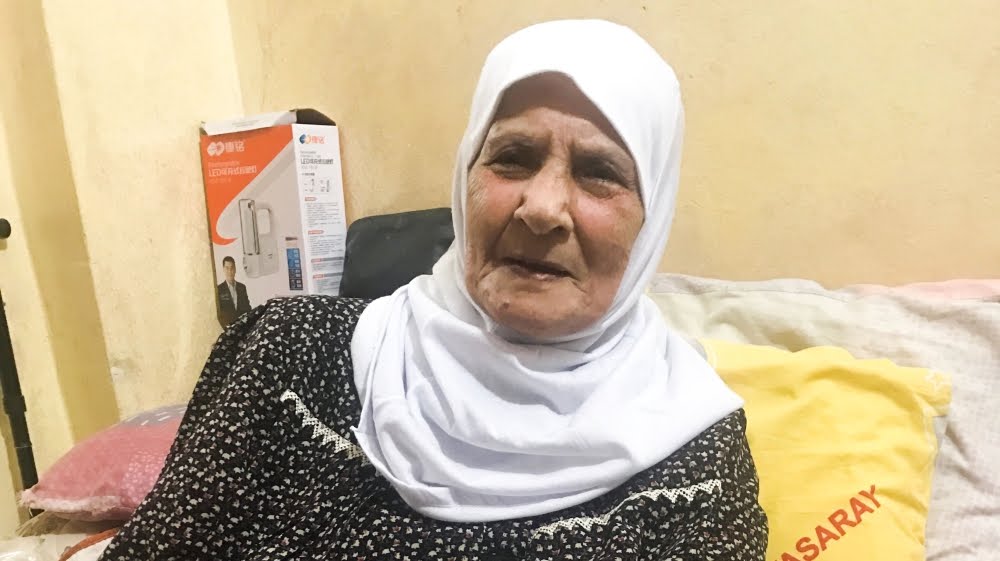 |
|
Zahiya
Dgheim was forced to leave her village at 20 [Al Jazeera]
|
'Most
beautiful place on Earth'
More than
750,000 Palestinians were forcibly driven away from their lands by Zionist
militias in a campaign that led to the creation of the state of Israel in 1948.
Referred to by the Palestinians as the Nakba,
or Catastrophe, the violent expulsion marked the beginning of a painful chapter
of mass displacement and military occupation.
Between
1947 and 1949, the militias seized more than 78 percent of historical
Palestine, ethnically cleansed and destroyed about 530 villages and cities and
killed about 15,000 Palestinians. More than 100,000 Palestinians sought refuge
in neighbouring Lebanon - some arriving on foot, others crammed into vehicles.
The
refugees were initially welcomed in Lebanon amid a widespread belief they would
soon return home. But as the months turned to years and the years to decades,
things changed. Seen as a burden, the refugees were largely left helpless, with
UNRWA the only entity supporting them.
To this
day, their presence is seen as a threat to Lebanon's fragile sectarian
system. Denied fundamental rights, Palestinians in Lebanon are effectively banned
from working in 72 occupations; they cannot own land, do not have access to
free educatio, and have to issue a hard-to-obtain permit to bring construction
materials into the camps to renovate their homes.
Hailing
from the village of al-Kabri in the Galilee, Leila's parents also fled to
Lebanon with the belief that they would only stay for a few days.
After
seven decades in Burj Barajneh, Leila's mother - 90-year-old Zahiya Dgheim -
still reminisces about the home of her youth: a three-story brick house
overlooking a spring in her now-destroyed village.
"Al-Kabri
is the most beautiful place on Earth," she says slowly, casting a frail
figure as she lays under thick blankets on her large bed in the family home at
Burj Barajneh.
Zahiya,
who suffers from a chronic lung infection, had been married for four years when
the state of Israel was created in 1948.
"My
wedding day was the most beautiful day," she says, bringing to mind the
years before becoming a refugee. "They [covered] me in gold jewellery that
layered over my embroidered gown and paraded us in the wedding ceremony,"
she says of her and her now-late husband.
“They
put me on a white horse,” she adds. “Around me were my friends
carrying candles; everyone was dancing in our honour.”
put me on a white horse,” she adds. “Around me were my friends
carrying candles; everyone was dancing in our honour.”
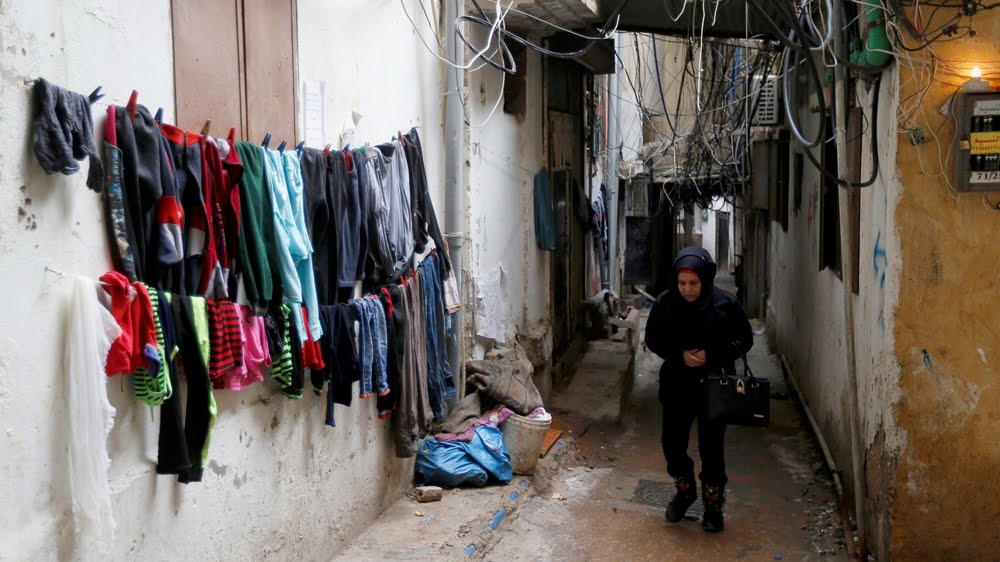 |
|
The
hazardous power cables have claimed the lives of at least
55 people since
2015 [File: Reuters] |
Single
motherhood
motherhood
But for
Leila, such memorable anecdotes feel a world apart. For her, the only reality
is that of being a Palestinian refugee in Lebanon – and particularly a woman
raising her family on her own.
Leila, such memorable anecdotes feel a world apart. For her, the only reality
is that of being a Palestinian refugee in Lebanon – and particularly a woman
raising her family on her own.
After
getting married, Leila left with her Palestinian husband who had a job in
Libya, only to return as a mother of four daughters less than 10 years later,
following the couple’s separation.
getting married, Leila left with her Palestinian husband who had a job in
Libya, only to return as a mother of four daughters less than 10 years later,
following the couple’s separation.
“I
came back, and everything was changed; I didn’t recognise the camp’s
streets,” Leila says.
came back, and everything was changed; I didn’t recognise the camp’s
streets,” Leila says.
With her
youngest child just three months old, Leila realised she urgently needed to
find a way to support herself and her young daughters as she moved back into
her parents’ house.
youngest child just three months old, Leila realised she urgently needed to
find a way to support herself and her young daughters as she moved back into
her parents’ house.
As a
Palestinian woman, chances of finding work outside the camp were almost
non-existent, so Leila’s mother helped her set up a kiosk selling grocery
items.
Palestinian woman, chances of finding work outside the camp were almost
non-existent, so Leila’s mother helped her set up a kiosk selling grocery
items.
“I
used to carry goods back and forth on a big wooden cart – I would be pushing it
all alone,” she says, with tears running down her face.
used to carry goods back and forth on a big wooden cart – I would be pushing it
all alone,” she says, with tears running down her face.
“I
would walk from Dahiyeh [a nearby area] with bags of bread on my head, no
matter the weather.”
would walk from Dahiyeh [a nearby area] with bags of bread on my head, no
matter the weather.”
Three
years later, Leila closed the kiosk to run a cashier stand at the local
vegetable market – a job she held for 21 years – becoming a familiar face for
many of the camp’s residents.
years later, Leila closed the kiosk to run a cashier stand at the local
vegetable market – a job she held for 21 years – becoming a familiar face for
many of the camp’s residents.
“The
girls grew up, and I made sure they went to school … I thank God that I never
had to ask anyone for anything.”
girls grew up, and I made sure they went to school … I thank God that I never
had to ask anyone for anything.”
The third
generation
generation
Leila’s
four daughters, who have also spent their life in Burj Barajneh, grew up as
part of the third generation of people calling the camp home.
four daughters, who have also spent their life in Burj Barajneh, grew up as
part of the third generation of people calling the camp home.
Over the
past years, Syrian and Palestinian refugees fleeing the war in
Syria have also come to Burj Barajneh, making conditions even harder for the
camp’s residents, who share a space of less than 1sq km.
past years, Syrian and Palestinian refugees fleeing the war in
Syria have also come to Burj Barajneh, making conditions even harder for the
camp’s residents, who share a space of less than 1sq km.
“We
really suffer from power cuts,” says Leila. “At times, we only get
power for about an hour a day.”
really suffer from power cuts,” says Leila. “At times, we only get
power for about an hour a day.”
The
camp’s hazardous power cables have claimed the lives of at least 55 people in
the past three years, Mohammed Khaled, UNRWA’s chief area officer, told Al
Jazeera.
camp’s hazardous power cables have claimed the lives of at least 55 people in
the past three years, Mohammed Khaled, UNRWA’s chief area officer, told Al
Jazeera.
While
Leila struggled to provide the best for her four daughters as a single mother,
she was aware that they would be denied many rights, just as she had been.
Leila struggled to provide the best for her four daughters as a single mother,
she was aware that they would be denied many rights, just as she had been.
Yet, she
was determined to instil a sense of pride in them, seeing it as her duty to
empower them but also manage their expectations. She reluctantly refers to
Lebanon as her second home, but wonders if she would be feeling differently if
her daughters – three of whom are married with children – were granted
fundamental rights.
was determined to instil a sense of pride in them, seeing it as her duty to
empower them but also manage their expectations. She reluctantly refers to
Lebanon as her second home, but wonders if she would be feeling differently if
her daughters – three of whom are married with children – were granted
fundamental rights.
Leila
says she never thought of remarrying, even for the sake of her children.
says she never thought of remarrying, even for the sake of her children.
“I
was abandoned but raised my girls and worked to get through the years,”
she says. “When I needed someone in the darkest times I had no one, so why
would I need anyone from now on?”
was abandoned but raised my girls and worked to get through the years,”
she says. “When I needed someone in the darkest times I had no one, so why
would I need anyone from now on?”
Listening
nearby is Ramz, Leila’s youngest daughter. The petite 28-year-old suffers from
a developmental disability, as well as a partial physical disability.
nearby is Ramz, Leila’s youngest daughter. The petite 28-year-old suffers from
a developmental disability, as well as a partial physical disability.
Growing
up as her ailing grandmother’s helping hand, Ramz says she would love to be
able to join an educational facility and work with children.
up as her ailing grandmother’s helping hand, Ramz says she would love to be
able to join an educational facility and work with children.
“I
wish I could join an educational institute, to learn how to work with
children,” Ramz says.
wish I could join an educational institute, to learn how to work with
children,” Ramz says.
But this
is not a feasible career option, Leila says, explaining that camps like Burj
Barajneh do not have access to public centres that help refugees who share
Ramz’s disabilities develop. Palestinians with disabilities in Lebanon are
excluded from governmental services and therefore rely on assistance from
specialised NGOs.
is not a feasible career option, Leila says, explaining that camps like Burj
Barajneh do not have access to public centres that help refugees who share
Ramz’s disabilities develop. Palestinians with disabilities in Lebanon are
excluded from governmental services and therefore rely on assistance from
specialised NGOs.
“I
fear for her safety,” Leila says, explaining how people, unfamiliar with
Ramz’s condition, tend to lack the skills needed to communicate with her
effectively.
fear for her safety,” Leila says, explaining how people, unfamiliar with
Ramz’s condition, tend to lack the skills needed to communicate with her
effectively.
‘We want
to die on our land’
to die on our land’
A family
of women, Leila and her daughters have created their own traditions, including
a weekly gathering in the family home to spend the night together.
of women, Leila and her daughters have created their own traditions, including
a weekly gathering in the family home to spend the night together.
Occasionally,
her curious grandchildren would gather around their great-grandmother Zahiya,
eager to hear more about the Palestine she endlessly speaks of.
her curious grandchildren would gather around their great-grandmother Zahiya,
eager to hear more about the Palestine she endlessly speaks of.
“I
tell my grandchildren, one day, I hope you go back and see our home,” says
Zahiya.
tell my grandchildren, one day, I hope you go back and see our home,” says
Zahiya.
“Every
time I talk about my home, I see myself in it.”
time I talk about my home, I see myself in it.”
Palestinians
in the camp still held on to the “lingering legacy” of late
Palestinian leader Yasser Arafat, who had become an icon of the Palestinian
diaspora’s struggle for the right to return.
in the camp still held on to the “lingering legacy” of late
Palestinian leader Yasser Arafat, who had become an icon of the Palestinian
diaspora’s struggle for the right to return.
But for
Leila, the right of return has been slipping away year after year.
Leila, the right of return has been slipping away year after year.
“We
were closer to the right of return decades ago than we are now,” she says.
were closer to the right of return decades ago than we are now,” she says.
“But
eventually, we want to die on our land with our dignity, knowing our
enemy,” adds Leila.
eventually, we want to die on our land with our dignity, knowing our
enemy,” adds Leila.
“Not
here, not like dogs, not like this.”
here, not like dogs, not like this.”

